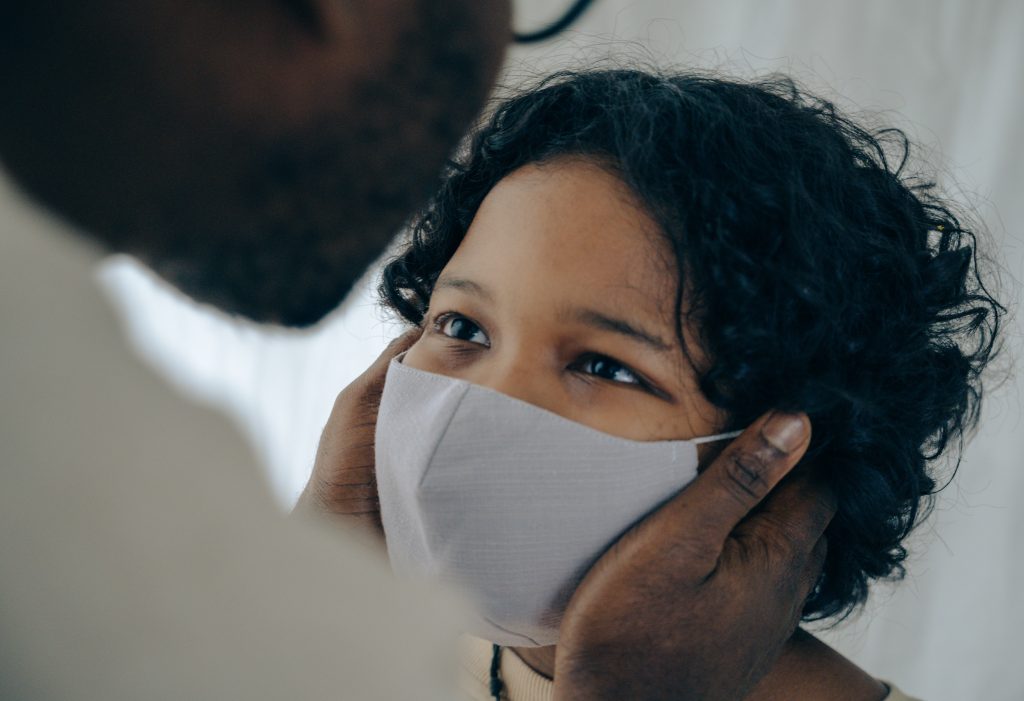What will life be like for our kids without them being able to see anyone smile? COVID-19 has introduced us to mandatory face coverings and mandatory masks. These face coverings strip from us the experience of the magic of the smile. My four year old’s preschool teacher retired a few months back. They had a social distancing zoom event for her, and when I asked her what was her favorite part of the Zoom ‘retirement party,’ she said, ‘when my teacher smiled, she hardly ever smiles.’ I gasped in horror as I imagined my daughter sitting in this teacher’s class everyday for the past year, without being smiled at. Yikes!
It may seem like a small thing, but there is so much social development that comes from the smile. When you know that ‘A is for apple’ and that one plus one is two, and even after you find the confidence to raise your hand to say it out loud, you look up, and instead of a smile, your teacher has the blank face.
Imagine having a schoolgirl crush on someone that is equally smitten, but the two of you can never smile at each other. How does the connection ever take shape? Will you still get butterflies? Will you even develop a crush without knowing what their smile looks like? Will you two sneak off to the bathroom together and sneak a look at each other’s smiles?
Well, my daughter has a new pre-K teacher this year, thank goodness, however, she still won’t receive the benefit of the smile. She will be wearing a mask and so will her teacher. Of all the dialogue that is thrown back in forth in the media, the one thing that doesn’t come up much is that kids need smiles to thrive. Actually we all do. Imagine how disengaged a school teacher becomes if they never see the smiles from their students. Smiles are extremely undervalued.
Years ago at The University of Massachusetts, the ‘still face experiment’ (Link https://youtu.be/apzXGEbZht0) was devised. In an experiment that now seems rather cruel, parents started out actively engaging with their babies. They talked, laughed, and engaged their babies. Then without warning, the experiment goes dark, and parents turned away from their babies and they stopped reacting to them. Instead of smiling and engaging them, they looked at their babies with blank expressions. When the parents disconnected from their babies by removing the smile from their faces, as I am sure you can imagine, the babies became unconsolable, they had a fit.
Subsequent studies demonstrate that when babies lack that type of connection, it literally damages their development, it harms their ability to bond and to control their emotions all the way into adulthood. The benefits of smiling are limitless. When your child sees a smile from their trusted caregiver, teacher, nanny, or parent, they feel reassured, they experience comfort, they experience a sense of well being. Perhaps you remember a time when you fell and hurt yourself, but a smile from the right person made you feel like everything was ok.
Now imagine that your child can never see yours nor their caregiver’s smile because it’s covered with a mask. Let’s imagine the long-term impact that this has on your child. Oddly so, we don’t have to imagine, that day is upon us. When the kids finally go back to school, they will wear masks, their friends will wear masks, their teachers will wear masks, when you show up to pick them up, the first thing they will see is your mask. It’s important that we strategize to minimize the effect that it may have on their sense of well-being. Here are some strategies to integrate into your daily and weekly routine.
- Trust your nanny. If you have a nanny helping you, ask her to get tested for COVID 19 and ask her if she is willing to social distance when she is away from your home so that she will not need a mask all day for her childcare duties. One thing I actually look at on the camera when I am away from home, is to see if our nanny is smiling at our youngest. The smile not only soothes my daughter, but it soothes me as well.
- When you are out running errands or shopping with your little ones, steal moments when you are away from others, to pull your mask down to quickly flash a smile. The smile will provide reassurance and comfort that your little ones need in order to feel confident and secure.
- Socializing in person helps keep your immune system strong and alive. Direct face-to-face communication releases a waterfall of neurotransmitters tasked with regulating our body’s response to stress and anxiety. It is unclear if a FaceTime call elicits the same cascading event. So in person socializing is important.
Even if you aren’t doing a school pod this year, find a group of two to three children that you can schedule social time with. These should be kids from families with values similar to your own, so that you trust them. The kids can properly social distance while they socialize. This will remind your kids how to socialize in person, which is a skill that will carry them into adulthood. Without in-person socializing, social skills will suffer, so take some time to create social situations for your kids to interact with other children.
- Hug them and reassure them more now than ever. It will not be uncommon for your kids to seem a little needier during these times, and in the teens this will mean that they may have an even greater attitude problem. Keep in mind that they have been isolated for months. Be patient and be prepared for it. Give them a little extra TLC, even if they seem unbothered.
- Get them off of their tablets as much as possible, and by all means, unless someone is sick in the home, do not wear masks in protected environments.
- Smile more than you normally do. Your kids need to see it, but you need to feel it too. If you smile on the outside, you will gradually feel like smiling on the inside.
There’s something magic about a smile, and we know that each time you smile at a person (and they can see it), their brain stimulates them to do the same. In an organically choreographed brain dance, you both release feel-good neurotransmitters in your brain, your reward centers are activated, and as a result you both increase the chances of living healthier lives. We need smiles and our kids certainly do.
We will likely be required to wear masks for a while now, and since our kids need to learn how to smile and also feel all of the magic that comes with being smiled at, we have to find strategies that will protect them. Smiling and being smiled at, fosters healthy brain development, robust social skills, confidence, and healthy immune systems. These tips will help you do just that, all while providing the balance of being ‘safe.’
Dr. Rachael Ross is a Board-Certified Family Medicine Physician and Clinical Sexologist. To schedule an appointment with her call 310-451-8880 or email us at info@akashacenter.com
References:
R.D. (2000). Neural correlates of conscious emotional experience. In R.D. Lane & L. Nadel (Eds.), Cognitive neuroscience of emotion (pp. 345–370). New York: Oxford University Press.
Karren KJ, et al. Mind/Body Health: The Effect of Attitudes, Emotions and Relationships. New York, N.Y.: Benjamin Cummings, 2010:461.
Facial attractiveness: evolutionary based research Phil Trans R Soc B June 12, 2011 366: 1638-1659.



















